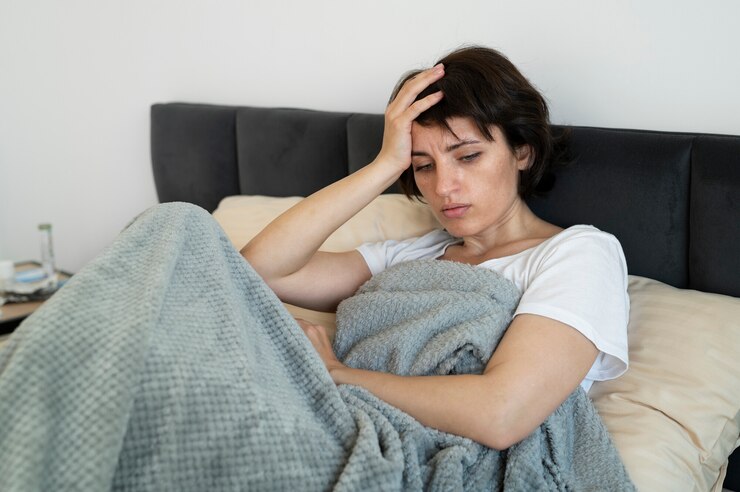


Perimenopause, often referred to as menopause transition, is a term that frequently comes up in consideration when we talk about women’s health, but what does it mean? It’s a phase that 80–90% of women come across once in their lifetime.
Here, we will discuss perimenopause, at what age it occurs, its symptoms, and how to treat it, so let’s dive in.
Before diving into what perimenopause is, it’s essential to understand what menopause is. Menopause is a point when a woman has not had a menstrual period for 12 consecutive months, which, in layman’s language, means periods have ended.
So, perimenopause, in general, implies menopause, i.e., a transitional period that leads to menopause. Therefore, the duration carried out until the periods have stopped is considered perimenopause.
Additionally, there is no fixed age for perimenopause; it happens at a different time for each woman. It usually begins in a woman’s 40s, but it can start as early as her mid-30s or as late as her 50s. The duration of perimenopause also varies, but it generally lasts between four and eight years.

As women grow older, their ovaries produce less estrogen, eventually leading them to stop producing eggs entirely. This transition of the ovaries with age causes perimenopause to happen. Although it’s possible to become pregnant during perimenopause,
Symptoms and signs vary from one woman to another. Still, if you are one heading to perimenopause, you’ll experience at least one of the following symptoms discussed below:
⦁IRREGULAR PERIODS
It’s one of the earliest signs that one can come across. The menstrual cycle becomes irregular, periods may become shorter or longer, and even the flow can be lighter or heavier because our ovulation process becomes unpredictable.
⦁HOT FLASHES
A hot flash in a woman is a sudden warmth in the upper body, primarily intense over the face, neck, and chest. One experiencing it is often diagnosed with perimenopause. These flashes can remain in the body for a few seconds or a minute.
⦁Night Sweats
Like a hot flash, night sweats are experienced at night and lead to awakening drenched in sweat. This symptom also happens to be an early symptom of perimenopause.
⦁MOOD SWINGS
Mood swings are common for every woman dealing with them before or after the menstrual period. So, during perimenopause, mood swings, irritability, depression, and anxiety are common.
⦁Sleep Problems
Night sweats make it familiar for one to have difficulty falling or staying asleep.
⦁VAGINAL DRYNESS
Decreased estrogen levels lead to a loss of vaginal elasticity and lubrication, therefore causing vaginal dryness. This also creates discomfort during sexual intercourse, causing it to be more painful.
⦁CHANGES IN SEXUAL DESIRES
Sexual arousal and desires may change during perimenopause. Some women may experience less desire for sexual intimacy, while others may not experience any change.
⦁URINARY PROBLEMS
Lower estrogen levels make the urinary tract more vulnerable to infections. Other urinary problems become prominent, like increased frequency or urgency to urinate.
⦁BONE LOSS
Hormonal changes caused during perimenopause increase the risk of bone loss or osteoporosis.
⦁Memory Issues
Due to hormonal changes and mood swings, women often notice problems with concentration and memory.

There is no particular, defined treatment for perimenopause. It’s a natural process that many women go through. The only cure to end this is menopause; when a woman finally reaches that point, all the issues end there. However, there are specific treatments or tips that one can follow to reduce the symptoms:
⦁HEALTHY DIET
Diet is always the solution to all our health problems, irrespective of where the problem is. Maintaining a well-balanced diet that includes fruits, vegetables, whole grains, calcium, vitamin D, and lean proteins can effectively help manage the symptoms of perimenopause.
⦁Regular Exercise
Modern lifestyles have reduced our physical activities compared to early lifestyles, so it is vital to incorporate regular exercise into our daily routines to help maintain a healthy weight, improve mood, and strengthen our bones.
⦁Stress management
During perimenopause, women often experience stress. Therefore, yoga, meditation, and deep-breathing exercises can reduce stress and improve overall well-being.
⦁STAY HYDRATED
Staying hydrated all day can help manage symptoms like bloating and dryness.
⦁Limit caffeine and alcohol.
Caffeine and alcohol can increase hot flashes and disrupt sleep, so it’s wise to consume them in moderation.
⦁BIRTH CONTROL PILLS
In some cases, doctors prescribe taking birth control pills to balance hormonal levels.
⦁Antidepressants
Doctors also prescribe antidepressants to relieve mood swings and increase the risk of depression.
It’s not something that needs a healthcare provider, but if it bothers your day-to-day activities, you should reach out and discuss it with your gynaecologist. Other symptoms need instant care as well.
⦁ Having blood clots in the menstrual discharge.
⦁ Experiencing spotting between periods.
⦁ After sexual intercourse, I experienced vaginal bleeding.
⦁ Periods that occur very close together.
⦁ Any changes in the menstrual cycle after a year of no periods.
Perimenopause is a natural phenomenon in a woman’s life. However, it comes with many issues and symptoms, though it needs to occur to reach menopause. One can reduce symptoms by taking proper precautions in diet, maintaining a healthy lifestyle, considering medical support, and staying informed of changes. It’s also equally important to understand what to expect and how to manage these changes to make this duration more manageable.
Remember, every woman’s experience of perimenopause is different and unique. What plays a vital role in this journey or duration is to have a support system, maybe through friends, family, or your gynaecologist, to discuss symptoms and strategies for coping. Embracing this change with knowledge and preparation can lead to a smoother transition into the next stage of life.


Whether you are suffering from arthritis pain, headaches, fatigue, depression, or even tumors, Dr. Ma Acupuncture Centre is the tried and tested provider of Chinese medicinal techniques that yield the desired results with the use of safe and proven effective solutions.
Here at Dr. Ma Acupuncture Centre, we are passionate about helping people feel better as they get healthier. We customize our acupuncture, Chinese Massage, and Gua Sha Therapy services to each individual’s precise needs. This means that you get the exact solution for your unique health issues every time.
So if you are in Ellicott City and are in search of the trusted specialist in acupuncture and Chinese Massage Ellicott City MD folks rely on, there is only one name to keep in mind – Dr. Ma Acupuncture Centre!

For additional questions, either fill out the contact form, send me an email, or give me a call at +1 443-756-0563, +1 301-473-2788